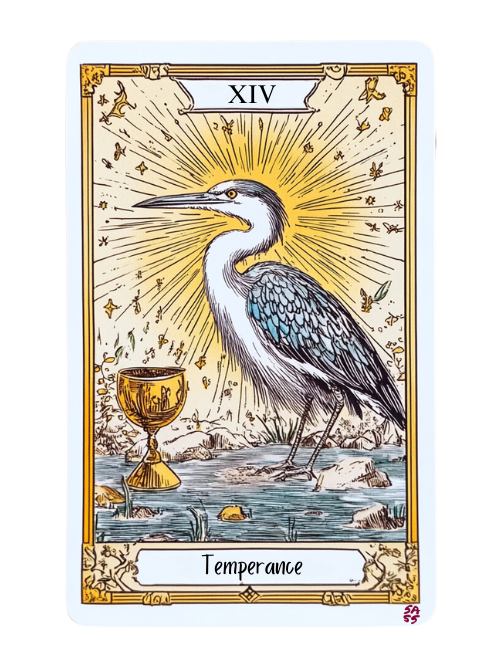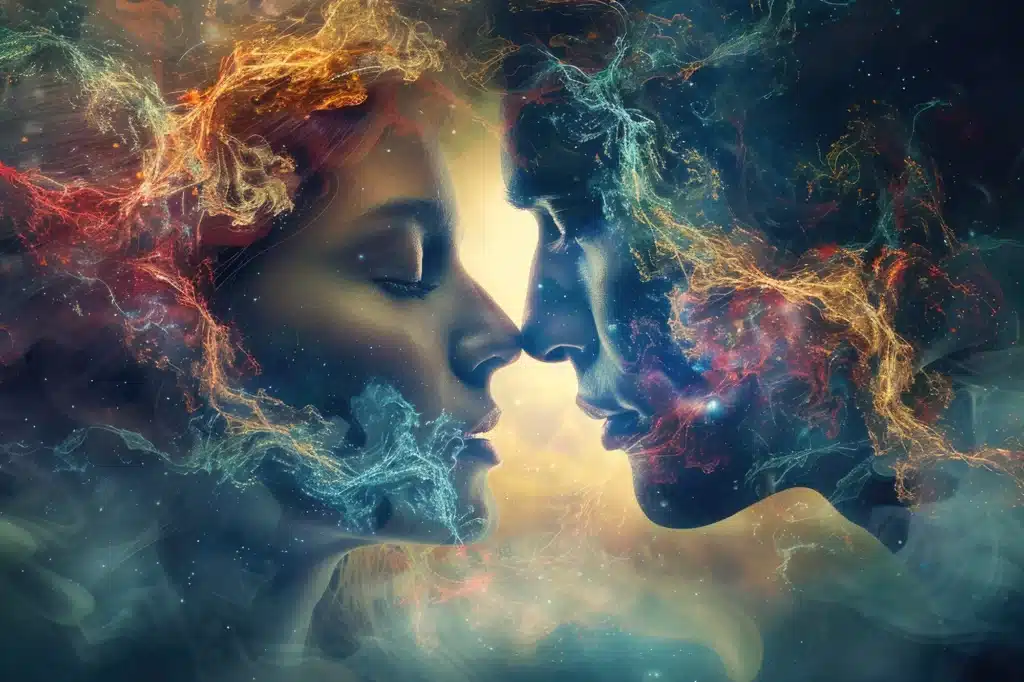In the world of fashion and design, symbolism plays a significant role in conveying deeper meanings and messages. The creative director of Christian Dior, Maria Grazia Chiuri, is known for her imaginative and visionary designs. The Spring 2021 show she found inspiration in the captivating world of Tarot. The Tarot is a powerful tool that has been used for centuries to unlock the mysteries of the human psyche and explore the depths of meaning and symbolism. By incorporating Tarot symbolism into their designs, Dior not only creates visually stunning pieces but also invites the wearer and viewer on a symbolic journey. The use of Tarot symbolism in fashion allows for a unique and transformative experience. The Tarot is not simply a deck of cards used for fortune-telling, but rather a rich source of symbolic imagery that can be interpreted in various ways. The short film illustrating the designs is well worth watching. Keep on reading to find out more about the use of Tarot in this fashion show and the hidden meanings behind each Tarot card.
All credits: DIOR
The High Priestess
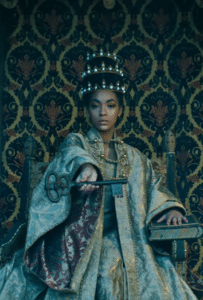
The High Priestess is one of the most prominent Tarot cards that Dior incorporated into their designs. When the High Priestess card is drawn, it represents wisdom and the sacred feminine. It serves as a gateway to uncovering secrets, undiscovered talents, and meaningful experiences in life. This exploration helps individuals gain introspection and delve into their inner selves.
By incorporating the High Priestess into their designs, Dior taps into the power of this archetype and invites wearers to embark on a journey of self-discovery and inner wisdom.
Representing the culmination of personal growth and inner exploration, this character symbolizes the resolution of one’s journey through the Major Arcana cards in a tarot deck. Her purpose is to guide individuals towards self-discovery and intuitive insights, fostering a deep sense of trust in oneself that comes with maturity.
Dior’s use of the High Priestess in their designs signifies a call to connect with one’s intuition and tap into the wisdom that lies within. This character represents the internal guidance that originates from within oneself, prioritizing one’s intuition over external influences and even ego.
The moon symbols on the card represent the culmination of femininity and womanhood. This figure embodies all goddesses, holding a book that is seen as a spiritual guide or source of wisdom.
In her interpretation, Chiuri includes a key to symbolize unlocking one’s potential and divine nature in a non-religious context. Chiuri dresses the High Priestess in an elegant robe and crown that reflect her status as an all-knowing goddess who has fully embraced her power. The film’s protagonist selects this card, marking the beginning of her journey towards self-discovery and empowerment through trusting her intuition and embracing feminine strength.
Justice
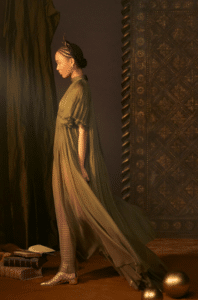
Next, she is welcomed by Lady Justice herself, who embodies fairness, judgement, and the consequences of our actions. This tarot card serves as a reminder that every choice we make has an impact and may not always result in equal outcomes.
Representing the ideals of Libra, Lady Justice seeks to uphold morality and hold individuals accountable for their choices. She prompts us (or those close to us) to take responsibility for our actions and abide by ethical codes.
This card often resonates with those grappling with notions of right versus wrong or fairness versus injustice; deep down inside they know what is truly just. Moreover, the presence of the Justice card also signifies karma – reflecting that good deeds are rewarded in due course.
Dior’s inclusion of the Lady Justice tarot card in their designs speaks to the theme of accountability and the understanding that our actions have consequences.
They remind us that in a world driven by instant gratification and individualism, it is important to consider the impact of our choices on others and strive for fairness and equality.
The character is dressed in a modest and understated silk gown selected by Chiuri for a specific purpose. In the tarot, Lady Justice symbolizes values such as worthiness and actions, as well as how one presents themselves to others.
This card represents a serious approach that prioritizes inner qualities over external appearances. Even though the lead character looks stunning wearing Look 1 from the collection, this does not sway her when it comes to making important decisions. In the film, Justice prompts the protagonist to make choices and consider their consequences carefully.
The Fool
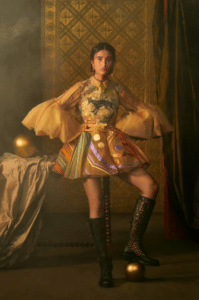
The main character of the film is at a crucial point in their decision-making process when they are interrupted by the Fool, representing an unexpected distraction. The Fool embodies innocence and signifies making impulsive choices without careful thought or reflection.
Just as the fool disrupts key decisions in Chiuri’s story, life often throws us off course with unpredictable circumstances. Drawing this card prompts us to consider how we can find a balance between our inner childlike qualities and our intuition.
The first card in the Major Arcana deck is numbered 0 and represents a spiritual essence before taking on human or divine form. In this depiction, the Fool is portrayed as a playful figure, adorned in Chiuri’s vibrant mini dress with bell sleeves.
The tarot deck symbolizes the journey of the Fool from spirit to human to divine being. It is understandable why Dior’s interpretation of the Fool character aims to momentarily distract the protagonist before guiding her towards her next destination on her personal journey.
This particular card resonates more with unconscious thoughts rather than conscious ones. When seen alongside the High Priestess, it encourages individuals to trust their own judgement and make independent choices despite any distractions that may arise along their path.
The symbolism of the tarot cards in Dior’s portrayal of Lady Justice and the Fool highlights the importance of considering the impact of our choices on others and the need to prioritize inner values over external appearances.
The Hanged Man
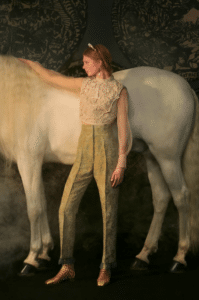
The Hanged Man, or in this case the Woman, symbolizes intuition and the unknown. This archetype reveals secrets by offering a fresh perspective or alternative viewpoint, rather than possessing complete knowledge like the High Priestess.
The Hanged Man challenges conventional thinking and invites the protagonist to see things from a different angle. In Dior’s interpretation, the Hanged Woman is depicted as a powerful figure suspended in mid-air, defying gravity and societal norms.
This card symbolizes the act of surrender, as depicted by the character who physically surrenders. It signifies a step towards enlightenment and is not bound by time. The card represents transformation and being open to releasing something without immediately seeing its outcomes.
In Dior’s film, the Hanged Man guides the protagonist to a door that unexpectedly opens on its side, showcasing how perspectives can shift with alternative viewpoints. The sideways-opening door represents an alternative way of perceiving things, prompting our character to embrace this new perspective and venture forward in her journey.
Temperance
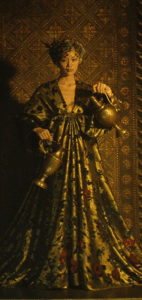
As the horizontal door swings open, it reveals the presence of Temperance. This particular card symbolizes various aspects such as wisdom, balance, self-control, and deep contemplation. It corresponds to Sagittarius and possesses a fluidity in its gender representation similar to how this sign can embody both masculine and feminine energies or neither at all thanks to its Mutable quality.
With its emphasis on alchemy, this card reflects the harmonious fusion of spirituality, intellectuality, and physicality – beautifully depicted by the triangle positioned at the heart centre within this character in the deck. The two water jugs she holds symbolize the conscious and unconscious aspects of the mind. The flowing water between them represents unity, flexibility, and boundlessness, as well as a release from dualistic thinking.
This card symbolizes the equilibrium between contrasting elements, such as femininity and masculinity. It is especially relevant considering that our main character’s feminine and masculine traits are currently pursuing separate paths in Dior’s film, but are soon to intersect once more.
Pay attention to the ships and faraway lands depicted in the background of this card. This represents embarking on journeys, but with caution before diving into unfamiliar territories. It carries a spiritual essence, symbolizing enlightenment.
The protagonist in Dior’s film is prompted by this card to embark on a significant journey through the tarot deck and Chiuri’s fashion collection, bringing her closer towards her destination of self-discovery and transformation.
The Star
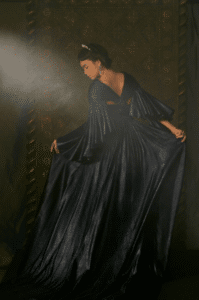
The card of Temperance guides Dior’s protagonist’s journey towards the Star, which represents the vastness of the universe and offers insight into celestial patterns.
The Star card reveals the enchanting aspects of existence, capturing the essence of freedom with a positive perspective such as hope and joyfulness. It’s fitting that while Dior’s protagonist connects with the Star, there is also an encounter with the Devil down the line illustrating that life can’t be all positive all of the time, struggle is necessary on the journey.
This tarot symbol reminds us to appreciate life’s wonders, mysteries, and pleasures. Amongst the 22 Major Arcana cards that unlock valuable lessons about life, drawing The Star brings hope and acts as a source of healing and blessing.
The Star represents the Aquarius card, symbolizing a water bearer of astrology and higher faith. Depicted on the card, like Temperance, the Star holds two water jugs. Rather than overlooking a landscape, this character is kneeling at the water. The water symbolism of both cards interplays nicely with the fluid transition of this woman’s journey, which eventually ends in the water as well. The Moon, like the Star, also holds or controls water in her own right, so it’s no surprise that both would lead these two—or is it one?—characters to water.
Depicted on the card, similar to Temperance, the Star also holds two water jugs. Instead of overlooking a landscape, this character is kneeling at the water. The symbolism of water in both cards contributes effectively to this woman’s fluid journey that ultimately concludes with her immersion in water.
Similarly, just like the Star, the Moon has dominion over or influences over bodies of water as well. Hence, it comes as no surprise that both these figures—whether they are separate entities or one and the same—would be led towards significance by their association with water.
The Devil
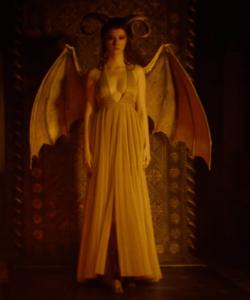
As the story unfolds, one character encounters The Star card while the main protagonist with her distinctive pink hair finds herself trapped in The Devil’s domain. Symbolically, The Devil represents our hidden and darker aspects that cannot be easily evaded, as exemplified by the lead’s futile attempts to flee from this influence.
The Devil card is known for its associations with temptation, materialism, and addiction. The Devil card serves as a reminder that we may find ourselves entangled in unhealthy patterns or negative influences.
The Devil urges us to confront our fears, acknowledge our hidden aspects, and bravely face them. This card represents the allure of excess, pleasure-seeking, and enticing distractions. It signifies sexuality, sensuality, the pursuit of desires, alluring seduction, and intense emotions in the deck.
This card represents self-acceptance and exploring your sexuality; it’s not surprising that this character is dressed in a nude-coloured outfit resembling lingerie to symbolise her divine allure. The scene in Chiuri and Garrone’s film presents an optimistic interpretation of The Devil.
When drawing The Devil card, she initially resists but eventually surrenders, embracing her inner darkness and experiencing a sense of liberation. This particular card depicts a devil holding two figures captive with shackles at its feet, representing their desire for freedom.
True freedom is found in the realization that our darker aspects are not inherently harmful, but rather an integral part of who we are. By confronting the devil within us, we can liberate ourselves from those parts that have succumbed to its toxic influence. This interpretation of the tarot card encourages us to embrace our shadow and incorporate our primal instincts into a transformed and evolved self.
The Moon
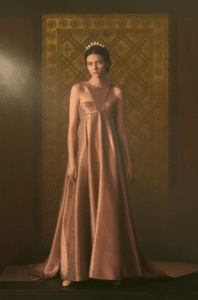
After emerging from her encounter with The Devil, the muse is welcomed by The Moon card, which guides her towards Death. The Moon card represents intuition, dreams, and the unconscious mind.
The Moon card symbolizes a sense of stillness, darkness, and allure. It portrays The Moon’s influence on the rising tide, representing the connection between water and emotions. This particular tarot card is associated with an intensification of feelings.
In the movie, The Moon guides our character towards both water and Death. Symbolizing illusions and deceptive appearances, the moon reveals that things are not always as they appear. We have mistakenly believed that there are two main characters in this fashion film; however, it appears that these two individuals are actually different facets of a single entity.
It seems intentional that Maria Grazia chose a radiant blush fabric and incorporated moon-shaped curves in the neckline and bodice. These design elements create an opalescent effect and give the illusion of grandeur, making The Moon appear more prominent. Additionally, as the wearer moves, the train of the dress waxes and wanes like a moon phase.
Death
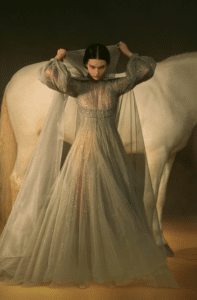
The Death card urges you to let go of the façade and reconnect with your true self. It signifies a conclusion, whether it be the end of a phase in life, ego dissolution, or transformation. Embracing the transformative power of Death is an essential part of the journey. In tarot, the Death card can be seen as a representation of rebirth and transformation.
Though commonly perceived as negative, this card typically represents closure and renewal. Embracing vulnerability and releasing attachments allow for personal growth embodied by the Death card’s symbolism. Dior’s incorporation of the Death card in their fashion collection signifies a departure from conventional interpretations.
The elegance of the Death’s ballgown, designed by Dior, along with a jewelled executioner’s mask could symbolize the seriousness and importance of this occasion. Death signifies a significant spiritual transition, and the opulence and theatrics of the gown and its accessories depict the magnitude of that transformation.
The post Dior and Tarot: Decoding the Symbolic Journey appeared first on askAstrology.



